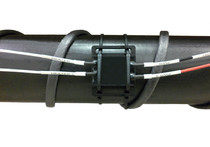Versatility and Configurations
SoliStat is not just a single off-the-shelf product but a fully customizable solution, with a range of options to fit almost any DC temperature control application.
Application Notes and Available Options
The options below are what we have built before, but are by no means the only possibilities. Our engineers are always available to work on configuring a SoliStat for a new application.
Basic specification options
Voltage: A standard SoliStat can switch any supply voltage from 6 to 24 volts, making it ideal for the common supply voltages of 12V and 24V. We have also built higher-voltage models – for example, a 48V model for communications applications.
Amperage: The standard SoliStat is built to handle a maximum of 10A, but high-amperage models are also available, including 15A, 20A, and 30A. Dual-channel SoliStats (see Channels below) with an internal RTD temperature sensor can switch 5A per channel, and those with external sensors can switch up to 10A per channel.
Channels: A standard SoliStat switches one electrical load, which allows it to control either a heater or a cooler. However, we also offer dual-channel models, which allow control of both a heater and a cooler, to enable more precise control over temperature control.
Control mode: SoliStat can be programmed for either ON-OFF or fixed ON-time control. PID control is also available on request; see the ordering page for more information.
Internal or external temperature sensor: A SoliStat with an internal sensor can be mounted directly on the item whose temperature is being controlled, as shown in the picture at right. In this case the pipe's temperature is measured directly through the body of the SoliStat.
Alternatively, an external thermocouple can be included, allowing the SoliStat to be mounted elsewhere and the thermocouple to be applied to the item being measured. SoliStats with an internal RTD include an anodized aluminum heatsink that is resistant to electrical conduction and corrosion.
Available electrical subsystems
Bypass (shutdown mode): A bypass circuit allows the operator to disable the heater or cooler completely, to conserve power if temperature control be unneeded for an extended period. This can be wired to an easily accessible switch, for example on a vehicle's dash.
System ready light: Alerts the operator that the heating/cooling circuit is connected properly and ready to work.
System fault light: Alerts the operator that there is a problem with the heating/cooling circuit, such as a disconnected lead or a damaged controller.
Fusing: A replaceable fuse disables the entire circuit if an excessive current flows to the heater: for example, in the unlikely event of a short circuit in the controller.
Crowbar circuit: Requires fusing. The crowbar circuit connects to the controller’s built-in monitoring system and triggers the fuse if it develops a malfunction (due, for example, to electrical disturbances such as lightning). Completely powering off the controller will normally restore it to proper functioning, so a replacement fuse is likely to be the only needed repair.
Programming details
- Single-channel models can be programmed for heating mode or cooling mode only; dual-channel models can also be programmed for heat/cool mode.
- Available with ON-OFF control or fixed ON-time control. PID control is available on request.
- With ON-OFF control: factory-programmable lower and upper trip-points from −40°F to +257°F inclusive, with a minimum deadband of 3.0°F.
- With fixed ON-time control: factory-programmable trip-point from −40°F to +257°F inclusive, with factory-programmable ON-time in 1-second increments.
Other notes
Setpoint accuracy: A small product test in our lab, comparing 5 individual SoliStat units, found an average unit-to-unit variation in setpoints of only ±0.55°F (±0.30°C), with a maximum variation between units of 1.2°F (0.64°C). We specify the listed setpoint accuracy to ensure that the products can equal or exceed the listed accuracy; the products as built are actually likely to have a somewhat tighter range than specified.
Reversed polarity: SoliStat is not protected against long-term accidental reverse-polarity connection to the power supply. If you require reverse-polarity protection, please contact your local representative or our factory (see below).
Uses in all industries
SoliStat is already in use in many industrial applications around the US and the world: applications as diverse as –
- Freeze prevention on diesel engine components (read case study), as part of ThermEvolve® systems.
- An autonomous climatology robot in Greenland (read case study).
- Freeze prevention in remote oilfields (read case study).
- DEF lines in diesel engines and locomotives.
- Battery warmers for engines and other outdoor-functioning machinery.
- Water lines and water filters in solar panels at remote locations.
- Component warming: battery cabinets for electronic assemblies that need to function in cold weather.
- EGR filters in Tier IV diesel engines.
Get SoliStat
Get in touch with us today – toll-free at (844) 288 2590 or through our {{contact form}} – to request a free quote or sample.


